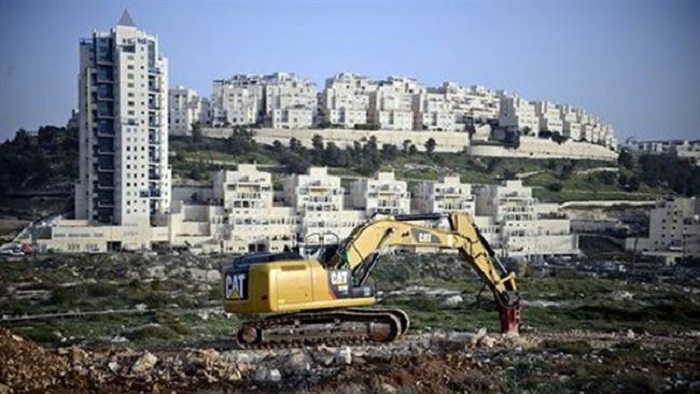Alwaght- Announcement of Palestine as the promised land of the Jews and launching a massive campaign of transferring them from around the world to the Palestinian territories in the years that followed the Second World War laid the foundation of one of the century's longest and most controversial disputes in international stage to date.
The Israelis under a series of excuses have been forcing the Palestinians out of their houses and seizing their lands. The seized Palestinian lands are reshaped into settlement units for the incoming Jews. A wide circle of countries and international organizations have protested the Israeli settlement projects on the Palestinian territories only to be responded to by Tel Aviv’s disregard of calls for construction cessation and international resolutions, and pressing forward with own plans.
The UN resolutions apparently assert that any Israeli settlement construction in the Palestinian territories occupied after 1967 is illegal, an international legislation Tel Aviv has never respected. In fact, during all these years the Israeli regime has turned a deaf ear to the pro-deal Palestinian and Arab sides whose most important demand and condition for peace is Tel Aviv’s halt of occupation of further Palestinian lands.
On the other side, the US vetoing of anti-Israeli United Nations Security Council's resolutions has strongly emboldened the regime’s leaders to press ahead with their breach of international law. Perhaps the US decline to block the non-binding UN resolution that criticized the Israeli settlements in December 2016, a month before the Barack Obama administration left the White House, marked a turning point in the international consensus against the Israeli abuses against the Palestinians' rights.
Calling the international bill “embarrassing” and “anti-Israeli”, the Israeli leaders very determinedly rejected any plan to respect the UN call for settlement construction halt. Afterwards, when President Donald Trump’s administration replaced the former one at the White House, the Israeli determination to speed up settlement construction was even sharpened as Tel Aviv was happy to deal with a new US president who during his election campaign backed off two-state solution and also told of intention to relocate the American embassy from Tel Aviv to Al-Quds (Jerusalem).
But what are the Israeli aims behind continuing settlement building on the one hand and declaring readiness to negotiate peace with the Palestinians and the Arab governments on the other hand? How will Trump approach this Tel Aviv’s contradictory behavior?
Territory expansion to offset the lack of strategic depth
The Israeli regime has always suffered from its territorial restriction and being surrounded by the Arab countries with whom it has a history of war and enmity. Furthermore, a set of issues including existence of 1.5 million Palestinians who account for nearly 20 percent of the Muslims inside the 1948 territories and their population’s high growth rates which can lead to imbalance of Israeli-Palestinian population by 2050 in favor of the Palestinians, increased Israeli reverse immigration, the fact that a majority of the Israeli citizens have dual citizenship, and predictions on decline of the Israeli army as a result of its manpower shrinkage all stand as security considerations of ongoing settlement construction.
When Oslo Accords were signed between the Israelis and Palestinians in 1993, Tel Aviv prioritized constructing settlements and increasing its population. It captured further Palestinian lands, established military posts there, struggled to Judaize them, and cut their geographic links to other Palestinians territories. The outcome was torn-apart West Bank districts without any connections to each other. Now with Trump in office and his green light for support given to Tel Aviv, the Israelis are even more relaxed in their re-energized settlement construction.
Settlement as a pressure tool
Tel Aviv’s approach to the peace process with the Palestinian groups within past decades, particularly since the 1980s, has been a mix of persuading them to quit armed confrontation for negotiation and persistent settlement plans and seizure of further Palestinian lands. Growing massive concerns about the Palestinian intifada, Tel Aviv seeks diplomatic normalization with the Arab states through upholding, though ostensibly, the peace process. The Israelis take advantage of the settlement processes as a pressure instrument in talks with Palestinians for an upper hand.
The former US administration of Obama showed opposition to this double-faced strategy, blaming it for failure of the steps taken to finalize the two-state solution. But now under Trump’s administration, Washington appears to side with Tel Aviv in believing that this Israeli behavior yields the favorable results. Last month, Trump, during his meeting with Israeli regime’s Prime Minister Benjamin Netanyahu, rejected the idea that two-state solution was the only way to peace, tacitly threatening the Palestinians with wider support for the Netanyahu measures.
Trump, during the meeting, broke up with decades-long-held American policy, asserting that he bore no commitment to the two-state initiative, adding that he will even stick to a single-state solution if proves viable and peace-producing. But Trump’s main strategy showed true color when Jason Greenblatt, Trump’s Middle East envoy, in his talks with Mahmoud Abbas, the Palestinian Authority's president, pledged that Tel Aviv will not announce new settlement plans if the Palestinians return to the negation table.



























